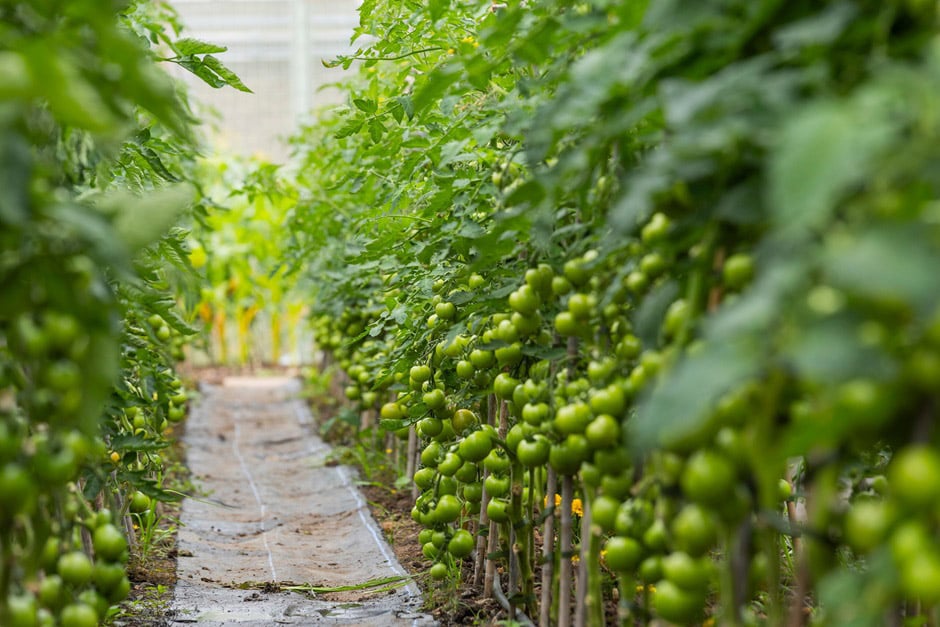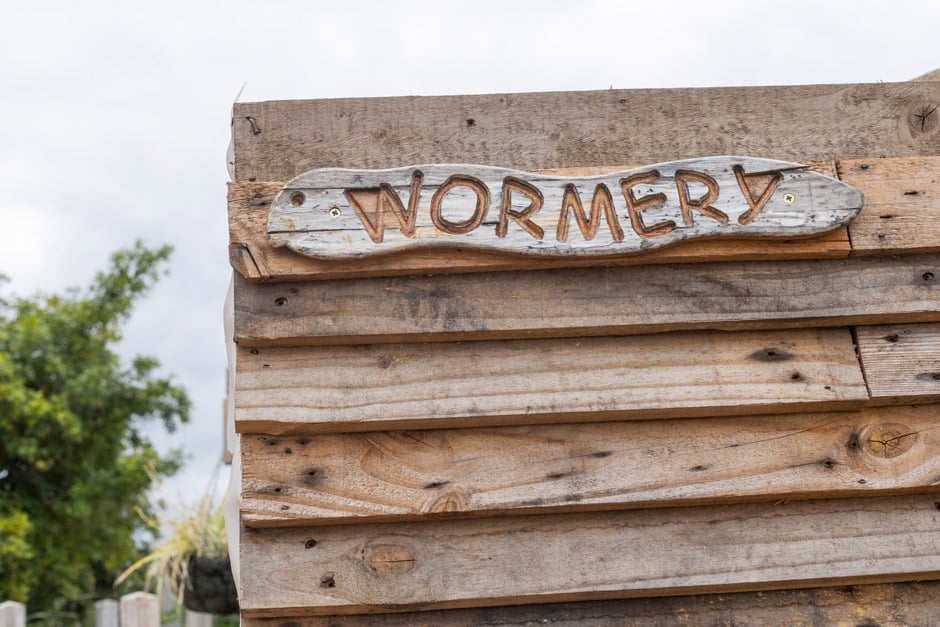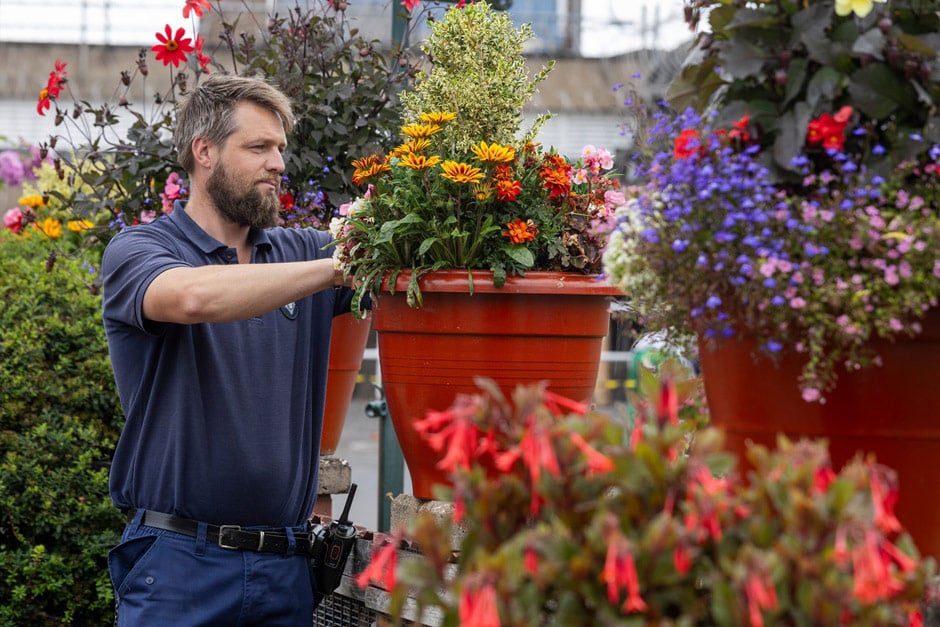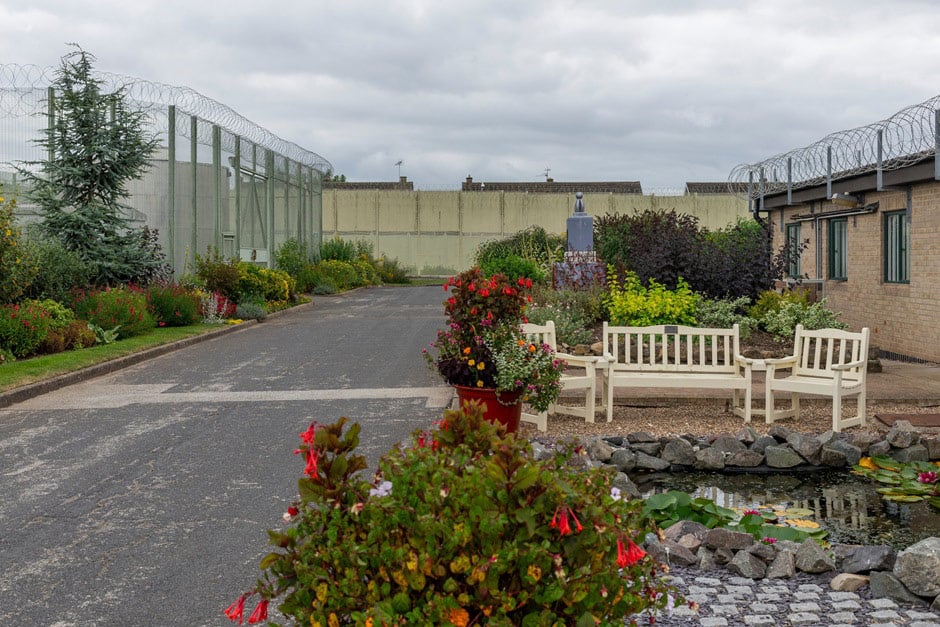HMP Whatton’s team approach shows the benefits that gardening brings to the prison community

The RHS and the Prison Service have awarded the Windlesham Trophy for the best-kept prison garden in England and Wales for 2024, to HMP Whatton in Nottinghamshire. The other finalists were HMP Garth, HMP North Sea Camp and HMP Littlehey.
What is the Windlesham Trophy?
The annual award, which was first awarded in 1983 by Lord Windlesham who was Chair of the Parole Board at the time, aims to celebrate horticultural success within prisons in England and Wales, while promoting the benefits that green space has on wellbeing and rehabilitation.
The 2024 trophy was presented by RHS President Keith Weed, the RHS judges and, for the first time this year, the current Lord Windlesham, whose father set up the competition.
“This year was the finest and closest competition since I became involved in judging the Windlesham Trophy 10 years ago,” says Jon Wheatley, Chair of Judges. “Horticulture at all four finalist prisons was of the highest standard with creative and innovative ideas coming to fruition. Congratulations to HMP Whatton. The involvement of the Governor, Caroline Vine and her staff, evidenced a whole team approach, which clearly creates a caring ethos and quality outcomes for prisoners. This can only result in success.”
Half a tonne of vegetables harvested

At HMP Whatton, gardening projects focus on growing food, cultivating high quality gardens and increasing biodiversity and habitats for wildlife.
The garden’s nursery production area consists of nine polytunnels where an extensive variety of soft fruits and vegetables are grown from seed. Around half a tonne of vegetables are harvested each season.
Crops such as tomatoes, beetroot and courgettes are used in the prison kitchens, with any surplus donated to other nearby prisons.
 There are also two large, heated greenhouses - one for seedlings and any cuttings and the other for potting on. The prison uses high-quality seeds to ensure the best yield. Pots and baskets are planted up with fuchsias and other trailing plants for display in the prison grounds. A further two greenhouses, built by prisoners, are used for growing cucumbers from seed.
There are also two large, heated greenhouses - one for seedlings and any cuttings and the other for potting on. The prison uses high-quality seeds to ensure the best yield. Pots and baskets are planted up with fuchsias and other trailing plants for display in the prison grounds. A further two greenhouses, built by prisoners, are used for growing cucumbers from seed.
Prisoners are involved in a wide variety of work, from growing vegetables in the polytunnels to maintaining machinery and taking cuttings. Many of the plants on site are propagated by prisoners.
Eco-friendly innovations
 Over the past year, the wormery and eight compost bays have been renewed. All the prison’s food waste goes into the wormery, and the liquid fertiliser produced is then used to feed the plants. Any vegetable waste and grass or other garden cuttings get shredded and composted and then mulched into the beds, borders and polytunnels to enrich the soil.
Over the past year, the wormery and eight compost bays have been renewed. All the prison’s food waste goes into the wormery, and the liquid fertiliser produced is then used to feed the plants. Any vegetable waste and grass or other garden cuttings get shredded and composted and then mulched into the beds, borders and polytunnels to enrich the soil.
Other initiatives include working with Waste Management and The Craft Shop to re-use materials that have been recycled from the prison estate. Laundry drums, for example, have been fashioned into innovative features in the gardens’ landscape design. Bug hotels, bird boxes and beehives are made by prisoners from recycled materials and used in the gardens.
 Prisoners are also involved in landscaping projects, such as the construction of a cascading stream inspired by nearby Chatsworth. The gardening team dug out the foundations, laid the brickwork and installed the pump. Other stand-out projects include building a Roman road-themed cobbled pathway and creating a war memorial garden.
Prisoners are also involved in landscaping projects, such as the construction of a cascading stream inspired by nearby Chatsworth. The gardening team dug out the foundations, laid the brickwork and installed the pump. Other stand-out projects include building a Roman road-themed cobbled pathway and creating a war memorial garden.
Habitats for wildlife
 Large wildflower areas encourage bees and other insects. There are several animal and bird shelters, including ones for swifts, and three ponds attract dragonflies and cinnabar moths. Voles and stoats have also been seen in the grounds.
Large wildflower areas encourage bees and other insects. There are several animal and bird shelters, including ones for swifts, and three ponds attract dragonflies and cinnabar moths. Voles and stoats have also been seen in the grounds.
“We plan to increase wildlife monitoring and are collaborating with agencies such as Nottinghamshire Wildlife Trust to further develop links with community-based horticultural and wildlife specialists that will further improve the habitat for flowers and fauna here,” says Craig Berry, Industries Manager at HMP Whatton.
High-quality gardens
 In keeping with this year’s ‘hot’ competition theme, the eye-catching planting scheme of deep reds, oranges, dark crimsons and yellows throughout was highly commended. “The golden garden filled with African marigolds in warm yellows and oranges was very effective,” says Jon Wheatley, Chair of Judges. “The excellent lawn and well-designed beds created a wow factor of a very high standard.”
In keeping with this year’s ‘hot’ competition theme, the eye-catching planting scheme of deep reds, oranges, dark crimsons and yellows throughout was highly commended. “The golden garden filled with African marigolds in warm yellows and oranges was very effective,” says Jon Wheatley, Chair of Judges. “The excellent lawn and well-designed beds created a wow factor of a very high standard.”
Growing skills and growing lives
 Staff guide prisoners to help them learn new gardening skills. “Many are complete beginners, so you’re starting from the foundations,” says David Lewis, Garden Instructor, HMP Whatton (pictured, above). “We put the emphasis on the prisoners. We discuss their ideas and if it can be done within budget, time and reason then we try to do it. It gives them a sense of ownership, pride and purpose. There is a therapeutic side. When they see the results of what they’ve planted, you can see the joy it brings. It’s good for their rehabilitation and mental health. Getting out into the fresh air and just focusing on what they’re doing in the gardens – it’s mindful. I am incredibly proud of what they’ve achieved.”
Staff guide prisoners to help them learn new gardening skills. “Many are complete beginners, so you’re starting from the foundations,” says David Lewis, Garden Instructor, HMP Whatton (pictured, above). “We put the emphasis on the prisoners. We discuss their ideas and if it can be done within budget, time and reason then we try to do it. It gives them a sense of ownership, pride and purpose. There is a therapeutic side. When they see the results of what they’ve planted, you can see the joy it brings. It’s good for their rehabilitation and mental health. Getting out into the fresh air and just focusing on what they’re doing in the gardens – it’s mindful. I am incredibly proud of what they’ve achieved.”
“I never knew the value of horticulture until I started practising it,” says one prisoner. “I love it. It makes my life worth living.”
Some prisoners undertake horticultural qualifications, equipping them with skills they can use for life after prison.
Places to pause
 Gardening and green space is important for everyone’s physical and mental wellbeing. At HMP Whatton, the gardens are valued by the whole prison community; staff eat their lunch surrounded by colourful shrubs and plants; prisoners have opportunities to pause and appreciate the smells, details and sounds of nature; and a drab, tired space has been turned into a peaceful Japanese-style garden for visitors.
Gardening and green space is important for everyone’s physical and mental wellbeing. At HMP Whatton, the gardens are valued by the whole prison community; staff eat their lunch surrounded by colourful shrubs and plants; prisoners have opportunities to pause and appreciate the smells, details and sounds of nature; and a drab, tired space has been turned into a peaceful Japanese-style garden for visitors.
 “Winning the Windlesham Trophy is a wonderful achievement, you can see all the hard work and preparation that has gone into this by staff and prisoners,” says Craig Berry, Industries Manager at HMP Whatton (pictured right with David Lewis, Garden Instructor, HMP Whatton). “It is such a pleasure for anyone who is walking through the grounds to admire the stunning gardens and wildlife features, which makes everyone have a feel-good factor, contributing to everyone’s health and wellbeing.”
“Winning the Windlesham Trophy is a wonderful achievement, you can see all the hard work and preparation that has gone into this by staff and prisoners,” says Craig Berry, Industries Manager at HMP Whatton (pictured right with David Lewis, Garden Instructor, HMP Whatton). “It is such a pleasure for anyone who is walking through the grounds to admire the stunning gardens and wildlife features, which makes everyone have a feel-good factor, contributing to everyone’s health and wellbeing.”
New opportunities
“This is a whole prison approach, where staff and prisoners take pride in their environment,” says Caroline Vine, Governor at HMP Whatton. “It has provided opportunities to learn new skills and qualifications which can assist upon release. It also helps with mental and physical health conditions. The prison surroundings are key to providing a calming environment, a place to reflect but also to enjoy the hard work the team has put in. I am delighted and proud that HMP Whatton has been chosen as the winner of this year’s Windlesham Trophy.”
“Horticulture can change lives and give people new opportunities to take their lives forward,” says Jon Wheatley, Chair of Judges.
The winner of the Windlesham Trophy in 2023 was HMP Littlehey in Cambridgeshire.
You might also be interested in...

